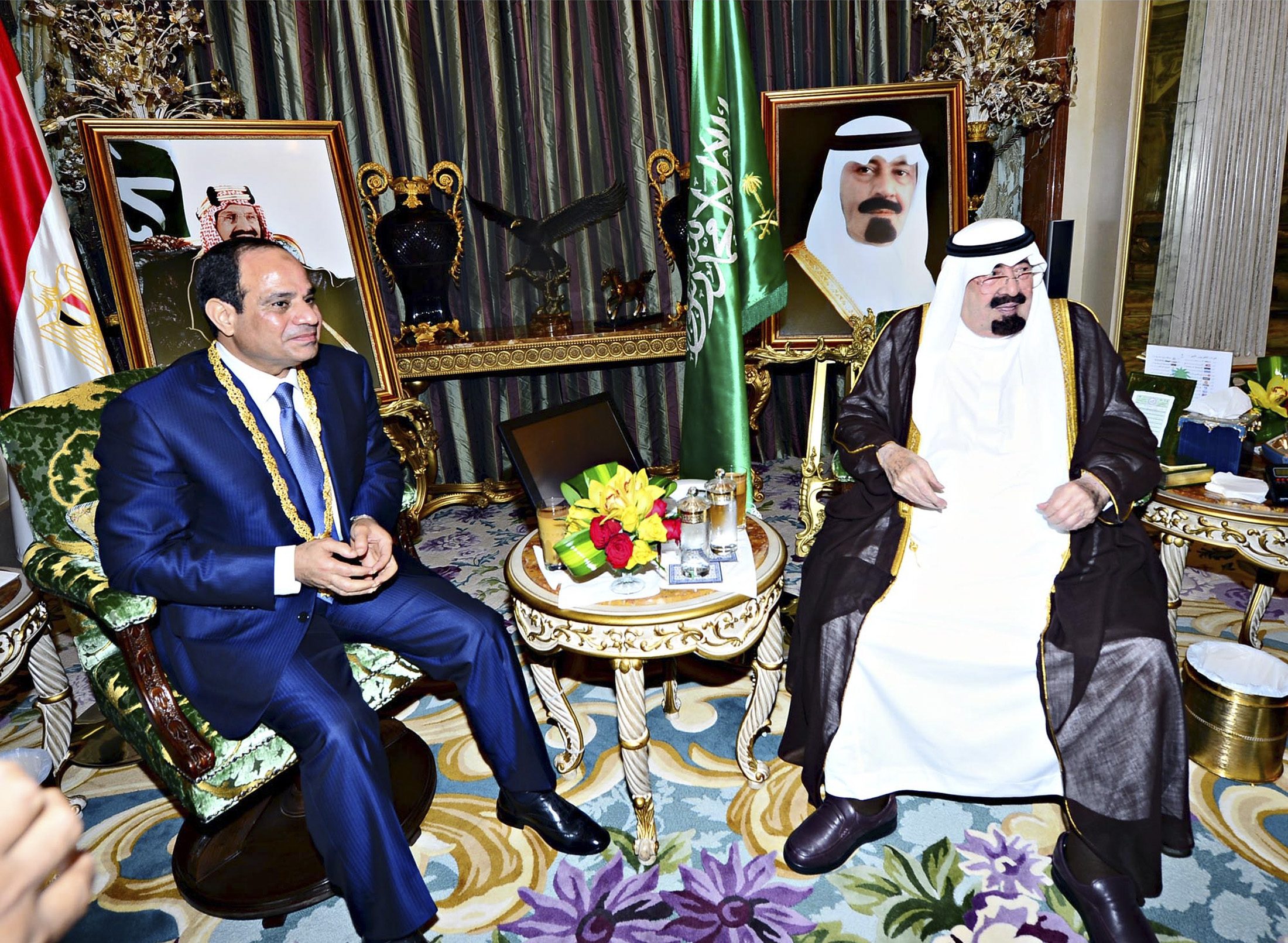Latest NEWS
- Aswat Masriya, the last word
- Roundup of Egypt's press headlines on March 15, 2017
- Roundup of Egypt's press headlines on March 14, 2017
- Former Egyptian President Hosni Mubarak to be released: lawyer
- Roundup of Egypt's press headlines on March 13, 2017
- Egypt's capital set to grow by half a million in 2017
- Egypt's wheat reserves to double with start of harvest -supply min
- Roundup of Egypt's press headlines on March 12, 2017
Egypt, Saudis seek united front against militant Islam

RIYADH, Aug 11 (Reuters) - The leaders of the Arab world's most populous state and its richest state met on Sunday to talk over joint efforts to counter Islamist militancy across the Middle East, including the turmoil now shaking Iraq.
President Abdel Fattah al-Sisi of Egypt and Saudi Arabia's King Abdullah are sworn enemies of the Muslim Brotherhood. They see the recent success of militants in Iraq as a threat to their stability and undermining security in the region.
Sisi's spokesman, Ehab Badawi, said the two leaders agreed to work together promote the "true and moderate values of Islam that reject extremism and terrorism".
"President Sisi and King Abdullah also reviewed the development of the situation in Iraq in light of the expanding of the circle of terrorism in the region," Badawi said, according to Egypt's Middle East news agency.
"There is no doubt that the meeting between the leadership of the two countries is important in light of the current circumstance of the Arab and Muslim nation," Saudi Foreign Minister Prince Saud al-Faisal said, according to state news agency SPA.
"(There are) external wars, intervention from foreign powers, internal sedition and disputes within the Arab nation at a time when it is in utmost need for solidarity and to stand together as one man to repel the enmities," he said.
The visit is Sisi's first since his election to the presidency this year. The pair met on King Abdullah's plane in Cairo in June, and Riyadh regards the former Egyptian army leader as one of its closest regional allies.
Saudi Arabia, along with Gulf Arab allies Kuwait and the United Arab Emirates, have provided some $20 billion in aid after Sisi ousted IslamistPresident Mohamed Mursi last year following mass protests against his one year in office.
King Abdullah has also called for a donor conference for Egyptexpected to take place either this year or early next year to provide further support to the most populous country in the Arab World.
Egypt has suffered a string of attacks by militants angry over the army's ouster of Mursi and the crackdown on Islamists in the country.
U.S.-allied Saudi Arabia, the world's largest oil exporter, is also worried by the advance of the Islamic State, previously known as the Islamic State in Iraq and Syria (ISIL), while at the same time it is unhappy with the policies of the Shi'ite-led government of Nouri al-Maliki it sees as being too close to arch-rival Iran.
GAZA WAR
Few details emerged from the late-night meeting at King Abdullah's Palace in the Red Sea port city of Jeddah. State media from both countries said the talks included Egyptian efforts to broker a ceasefire in a month-long fighting between Israel and Palestinians in the Gaza Strip.
Both countries have been accused of dragging their feet in efforts to end Israeli attacks, giving the Jewish state time to destroy Hamas, the affiliate of the Muslim Brotherhood that controls the Gaza Strip. Both have denied the charge.
Saudi and Egyptian media made no reference to fresh financial aid by the wealthy OPEC powerhouse or to the planned donor conference.
But state news agency WAM of the United Arab emirates reported thatUAE Foreign Minister Sheikh Abdullah bin Zayed flew to Saudi Arabia on Sunday night for talks with his Saudi counterpart at the airport inJeddah. It gave no further details.
King Abdullah made a brief visit to Egypt in June while flying back home from Morocco in a move that underscored the strong support the ageing monarch was showing for the new president. (Reporting by Ali Abdelatti in Cairo, writing by Sami Aboudi; editing by Angus McDowall, Larry King)










